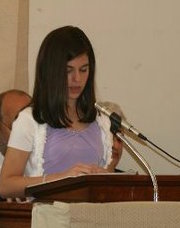
I Wasn’t Ready for My Bat Mitzvah at 13.
Thus, the Bat Mitzvah program was carefully curated to guide young congregation-members on an enlightening journey to “adulthood,” through an exploration of family history, personal values, heroes and role models, and a critical analysis of “What Becoming a Bar/Bat Mitzvah Means to Me.” The final piece asked students to choose any Jewish subject and conduct an in-depth research project. All of which culminated in the ceremony, during which, instead of reciting a Torah portion, the tween would read each of these essays, heavily edited by a crew of parents, mentors, and the rabbi, to our guests.
Neither my parents nor I truly understood the workload we were taking on as we began the process. And I mean “we.” Because, like other prospective Bar or Bat Mitzvahs, I was 12. I was very small and slightly immature for my age. I listened to Selena Gomez, chewed bubble gum in class, and wore feather extensions in my hair. If you asked me what being Jewish meant to me, I would have said “Hanukkah,” and if you asked me to write a research paper, I would have written a five paragraph essay citing three quotes from Wikipedia as “evidence.”
So when it came to my Bat Mitzvah preparation, I was at an utter loss—my brain just was not “there” yet. A process that asked me to not only write dozens of pages of content (my typing speed was roughly 25 words per minute), but also to reach some sort of deeper understanding of who I was, as a Jew? As a person? Forget it! Ironically or perhaps not, our congregation’s emphasis on research, critical thought, and self-examination was more intellectually demanding and required more self-awareness than a traditional Bar/Bat Mitzvah—which focuses on memorization, recitation and understanding of a text written by someone else. I had never been asked or taught to think in these ways before, to any significant degree.
In an attempt to be more personally meaningful than rote memorization of a Torah portion, and also perhaps to prove the legitimacy of a secular Jewish practice, my congregation’s process was too much. When asked to select a hero or role model, I was at a loss. When told to analyze my personal and family values, I made a list that now makes me cringe at its irrelevance to my life. And for my research project, I chose a subject I knew nothing about and then spent too long puzzling over to change my mind.
When it comes to adolescent cultural coming-of-age rituals, Judaism holds one of the youngest definitions of adulthood. And yes, I know that in our time, especially in non-orthodox communities, the practice is mostly symbolic. But I wonder if this is a good enough reason to place so much weight on this one ritual.
Although “adolescence” is a fairly modern social construct, science has shown that the modern teenage brain may as well be a pile of noodle kugel. Indeed, the human brain does not reach full maturity until about the age of 25. The legal voting age is 18. The drinking age is 21. So why do we still accept 13 as an appropriate age for even a symbolic measure of maturity?
Perhaps I should give Middle Schoolers more credit. Maybe some are ready; but if you look at an average group of pre-teens, you’ll find a huge variety of maturity levels. And it’s not even just about what they are capable of.
We must step back and acknowledge that it’s our (late capitalist, western) society that has created generations of these egg noodle-brained young people. We combine a rose-tinted attitude toward childhood with an over-emphasis on structure and supervision that leaves us ill-prepared to “come of age” at 13.
When I say young people are coddled even as more and more is demanded of them than ever, here’s an example: In the midst of a daily routine in which nearly every hour of the day was planned for me (school, piano lesson, dinner, homework), every behavior regulated (raise your hand, walk in line, ask for permission to use the bathroom), and every bit of news, entertainment, and educational information was chopped up into bite-sized, sugar-coated pieces and spoon-fed to me, I was suddenly thrown into this unfamiliar quest for wisdom and meaning.
After speaking to a few of my traditionally Bat Mitzvah’d peers, I would venture to say that these issues exist for all of us, regardless of affiliation. Because it happens so young, and because it becomes another demanding task in our over-scheduled lives, this sacred ritual is likely to have little lasting impact of the intended nature.
Sure, for some, the work was manageable and maybe even valuable, with the support of several adults. But isn’t that one of the purposes of a coming-of-age ritual that it foster community through its accessibility to all members? I feel strongly that a different template or even a different timeline would be equally—if not more—meaningful, and that the emphasis placed on the age of 13 is inequitable and outdated.
It’s time to modernize the Jewish rite of passage.
Arielle Silver-Willner is an intern at Lilith. She graduated from Connecticut College in 2018 and lives in Brooklyn, NY. When not in the Lilith office, she nannies and writes fiction.



